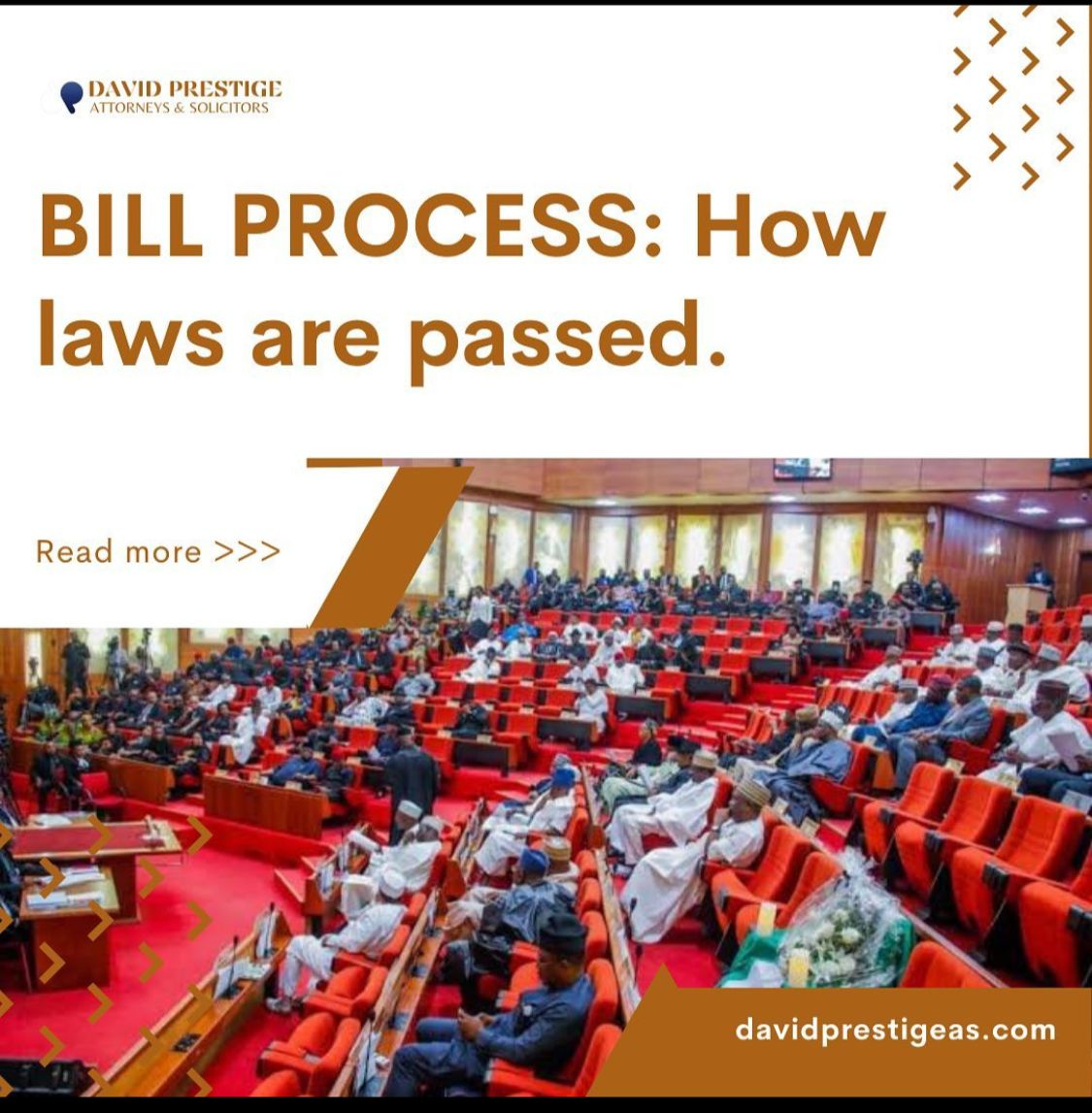INTRODUCTION
Nigeria is a Republic with federal democracy, and operates a federal Legislative system. The federal Legislature is the Bicameral national assembly which is composed of the Senate and House of Representatives. The National Assembly is the primary law-making body of Nigeria. As a federal Legislative system, laws can be made at the Federal, State, and even the Local Government levels, however, the foci of this short piece are the law-making process at the federal level – National Assembly.
Bills typically pass through the following stages in each House or Chamber:
- Bill origination
- Initial review
- Gazetting
- First reading
- Second reading
- Committee stage
- Report stage
- Third Reading and Passage
- Harmonisation
- Assent (President’s Signature)
Stage 1
BILL ORIGINATION
A bill is a proposed law presented to the legislature for deliberation and consideration. Before a law is enacted, a bill must be presented. A bill can be initiated by any citizen of Nigeria, however, only a Senator or Member of House of Representatives can introduce it on the floor of the respective house. A bill can originate either from the President – an Executive Bill – or from the members of the legislature.
Stage 2
INITIAL REVIEW
Once a bill is initiated in either of the chambers or houses of the legislature, the presiding officer/head of the chamber – the speaker (for the house of Representatives), and the senate President (for the senate) – forwards it to the relevant committee for review. For the house of Representatives, the Rules and Business Committee; and for the Senate, Committee on Rules and Procedures. The essence of this initial review is to determine if the bill conforms with all required standards before presentation to the chamber. The committee also determines the day the bill will be considered in any of the originating chambers.
Stage 3
GAZETTING
After the initial review by the committee, the bill is forwarded for gazetting. The idea behind gazetting bills before deliberation by the legislature is to create public awareness on the new bill, and give the interested persons an opportunity to contribute their quota to the process, either in support of the proposed bill or against it.
Stage 4
FIRST READING
First reading operates more like an introduction of the Bill. When the Bill is introduced, the Clerk of the House reads the short title of the Bill. The Rules and Business Committee then sets a date for its Second Reading. At this stage, there is no debate or discussions of the bill on the floor of the house; it’s simply an introductory stage.
Stage 5
SECOND READING
The second reading is the stage where the bill’s general merits and principles are debated. If the bill is read the second time, the House is deemed to have approved the bill in principle. On the other hand, if the bill is defeated on the floor of the chambers at the second reading, that will be the end of the bill.
If an executive bill, the deliberations commences with a motion by the senate or house leader that the bill be read the second time. The motion must be seconded by any other parties’ leaders. if the bill is initiated by a legislator, the bill sponsor will move the motion of second reading, and supported by any other member of the originating house. If the motion is not seconded, the bill cannot move further to second reading, and would be rejected.
Note that when the Bill is read a second time, it is referred to a Standing Committee unless a decision is made to commit it to the Committee of the Whole House, for consideration.
Stage 6
COMMITTEE STAGE
Following the second reading, bills are referred to the relevant committees for further consideration, scrutiny, and public hearings where necessary. An expert or a member of the public during public hearings, can make suggestions on any aspect of the bill, however, only a committee member can propose an amendment to the bill. The committee may approve the bill unaltered, amend it, rewrite it or even block it.
Stage 7
REPORT STAGE
When the Committee is done scrutinising the Bill, it presents its report to the House. If it is adopted, the Bill progresses to Third Reading.
Stage 8
THIRD READING
At this stage, the bill sponsor reports to the House that the Committee of the Whole have considered the bill and passed it with or without amendment, and then moves a motion that “the bill be now read the third time.” Generally, no amendment can be made to the bill once it has passed the third reading. However, if a legislator wishes to make an amendment, he/she must move a motion for the bill to be recommitted to the committee stage for the proposed amendment to be included.
Stage 9
CONFERENCE/ HARMONISATION
Note that when a bill originating in either of the chambers has been read the third time, a Clean Copy of the bill signed by the Clerk, and endorsed by the Presiding Officer of the originating chamber, shall be forwarded by its Clerk to the Clerk of the other house, with a message that it desires its concurrence.
- Where amendments proposed by the originating chamber are accepted by the other chamber, then the Clerk of the other chamber, retains the bill and sends a message to the originating chamber “that the Senate or House of Representatives, as the case may be, has agreed to the bill without amendments”
- Where however the other chamber:
- does not agree with the originating chamber on the bill; or
- agrees to the bill, but with its own amendments; a conference or harmonisation committee will be constituted comprising members of both chambers with the duty of reconciling differences on the bill and proposing a single position that would be adopted by the plenary of each Chamber.
Stage 10
After the recommendations of the conference committee are adopted, the bill then moves on to the assent stage.
ASSENT
Here, the Clerk of the National Assembly sends a copy of the “clean bill” to the President for his assent or signature.
If the President is satisfied with the bill, he gives his assent, but where he rejects or vetoes it, or does not communicate his assent to the bill within 30 days from the date the bill was sent to him, the National Assembly by a two-thirds majority vote can override the veto.
It is important to note however that there are unique procedures for passing specific types of bills such as the Appropriations Bill or National Budget and a bill seeking to amend the Constitution.
CONCLUSION
All bills must go through these processes before they are finally passed into law, and the stages must be on different days. However, in some circumstances, some bills go through accelerated deliberations as a result of their urgency or expediency for government policies. In this situation, all protocols and rules of each house will be relaxed for easy and quick passage.

